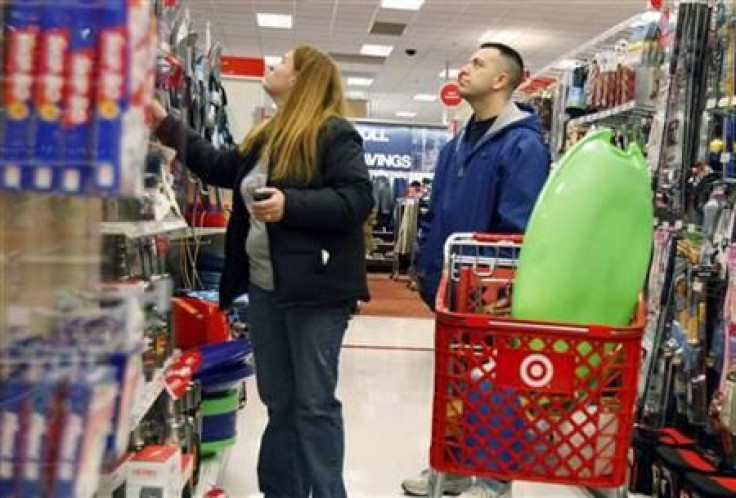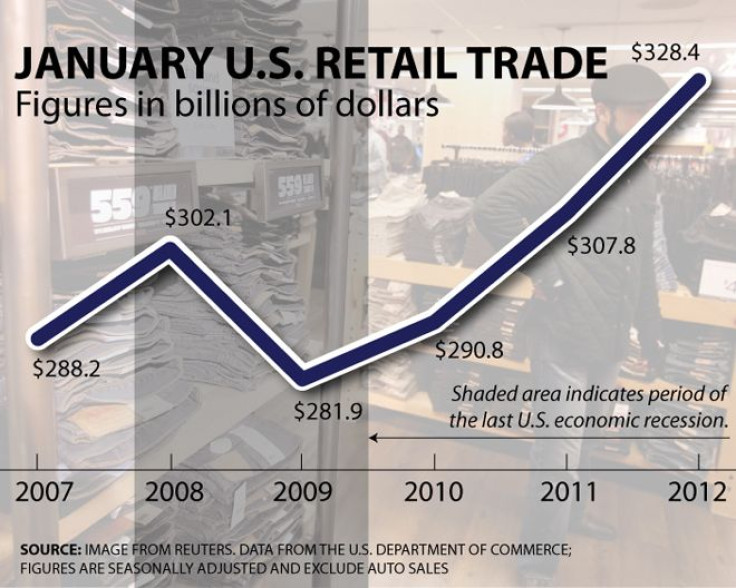January 2013 U.S. Retail Sales: Analysts Expect Consumer Spending To Have Softened After Payroll Tax Relief Expired

The U.S. Department of Commerce will announce its U.S. retail sales figures for January on Thursday morning, and analysts expect slower consumer spending -- thanks in part to the Jan. 1, 2013, expiration of the two-year-old 2 percent payroll tax cut.
Sixty-nine analysts polled by Reuters forecast an average of 0.1 percent month-to-month seasonally adjusted growth for total retail sales for January, down from December’s better-than-expected 0.5 percent growth, the best the U.S. economy performed in three months.
The January forecast that excludes cars and gas station purchases -- a figure considered a more accurate measure of general retail consumer sentiment because it excludes often volatile fluctuations in gas prices and big-ticket auto purchases -- is expected to grow by 0.4 percent, compared with the previous month.
One of the reasons for the expected softening performance: The temporary 2 percent payroll tax holiday came to an end on Jan. 1, increasing from 4.2 percent to its previous 6.2 percent level; as a result, Social Security is expected to keep an additional $120 billion of U.S. consumers' personal take-home income for the month, according to Bank of America Merrill Lynch.
“January’s retail sales report is eagerly anticipated as it will provide the first real guide to how the payroll tax hike affected spending,” said a research note from Capital Economics. “We estimate that it contributed to a 0.3 percent month-to-month fall in sales.”

Other indicators in the economy, however, suggest that consumers may have shrugged off the 2 percent cut to their paychecks, at least for the first month of the year.
“The extent to which spending is impinged at the start of the year by the increase in taxes suggests a larger-than-usual degree of uncertainty, although solid weekly chain-store sales and unit vehicle sales provide cause for encouragement,” a research note from Barclays said.
Auto sales kicked off the year with solid 7 percent growth for January compared with the same month last year. Also employment increased more than expected toward the end of last year, which helped some large retailers boost performance heading into 2013, like Minneapolis-based Target Corporation (NYSE:TGT), which saw its same-store sales grow 3.1 percent in January. Retail Metrics Inc. reported that sales of the 20 companies it tracks grew by 4.5 percent in January compared with the same month last year. Meanwhile, the S&P 500 got off to a good start in January, with a 6.37 percent gain since the start of the year.
Another factor that may have boosted consumer spending in January: the federal income tax refunds that many U.S. consumers expect to receive in the coming weeks, which might have influenced their discretionary purchasing.
There are some signs that the U.S. economy's tepid momentum won't last; for example, unemployment ticked up one basis point to 7.9 percent last month. The recent Thomson Reuters/University of Michigan consumer confidence survey shows that Americans are a little bit more upbeat in January than they were in December, but less so than in January of last year. The main concern appears to be uncertainties over U.S. fiscal policy.
Also, the survey showed that much of the gain in confidence was expressed in households earning over $75,000 a year, while lower income earners -- those more affected by the expiration of the payroll tax holiday and therefore more likely to make cutbacks on discretionary spending -- were less confident about their finances.
© Copyright IBTimes 2024. All rights reserved.












